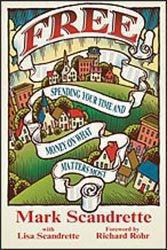 This month at the Patheos Book Club, we’re featuring a new book on faith and money called Free: Spending Your Time and Money on What Matters Most, by Mark Scandrette. The following is an exercise excerpted from the book.
This month at the Patheos Book Club, we’re featuring a new book on faith and money called Free: Spending Your Time and Money on What Matters Most, by Mark Scandrette. The following is an exercise excerpted from the book.
Appreciate Your Assets of Abundance
Life can seem scarce rather than abundant when we hurry or forget to savor all that we’ve been given…
What if we measured wealth in purposeful work, simple pleasures and meaningful relationships? Many of the things we enjoy most in life are hard to put a monetary value on. Rate the following assets from 1-5 (1 being lowest value, 5 being highest value) of abundance in terms of the pleasure and value they bring to you.
The beauty of the natural world
The pleasure of food
Physical health and safety
A sense of security and peace
Physical activity
Friends and family
Spiritual awareness
Romance and sexual intimacy
Emotional health and support
Access to information and learning
Noble and purposeful work
Realized talents and skills
Opportunities to love and serve
Creative expression
Free time and sabbath rest
The joy of music
Access to the arts and culture
Watching or playing sports
Character and wisdom
Patience and joy
Freedom and liberty
Strength to endure suffering and loss
Other __________________
Which nonmonetary/nonmaterial assets do you enjoy and appreciate the most?
Why do you think we tend to overvalue material possessions and undervalue other assets of abundance?
Experiment: Keep a Daily Gratitude Log
The practice of gratitude helps us recognize how we have been lavished and loved. “Give thanks to the Lord, for he is good; his love endures forever” (Psalm 106:1). Living gratefully is an important spiritual discipline because it affirms what is evidentially true—that we are cared for by an abundant Provider who delights to give us many good things. This week keep a daily gratitude log. At the beginning or end of each day write down five things you are thankful for. Try not to repeat. If you write each item in sentence form, your list will begin to take the shape of a poem. For example:
I am grateful for . . .
the taste of coffee in the morning
how sunlight fills a room with warmth
the gentleness of a kiss on the cheek
the power I feel in my legs when I run
Your list could be a random collection of things that move you, or you might pick a theme for each day: food, people, nature. Or you might want to spend some extra time outside looking and listening for signs of God’s abundance. At the end of the week read your poetic list to a friend or small group.
For more conversation on the new book Free, visit the Patheos Book Club here.













